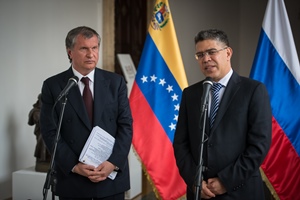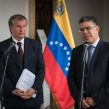
Is Latin America a New Frontier for Russian Policy?
Publication: Eurasia Daily Monitor Volume: 10 Issue: 146
By:

Latin America is not generally thought of as a high priority for Russian foreign policy. But as relations with the United States continue to stagnate as they did in 2008, Russia is apparently turning greater attention to that region in order to advance its goals and diminish US power. Russia is now a member of the grouping of emerging powers known as the BRICS with Brazil, Latin America’s leading power, as well as India, China and South Africa. And Moscow aims at—or at least talks about—restructuring the global international economic order, something for which Latin American support would be needed. More prosaically, the death of Venezuelan President Hugo Chavez and Caracas’s need to improve its economic ties with Washington have forced Russia to nail down its investments in Venezuela and apparently to shift at least some of the center of gravity of its support for an anti-American “Bolivarian war” (not necessarily or even primarily a shooting war) to other, more stable pro-Russian states like Nicaragua.
At the formal interstate level, Russia has ensured its economic ties to Venezuela. In January 2013, Russian oil giant Rosneft, led by Igor Sechin, clearly the COO, if not CEO, of Moscow’s Latin American policy, announced $10 billion of investment in Venezuelan energy projects, where Sechin’s company will be the leader of a consortium of Russian energy firms (RIA Novosti, January 30). By July, after a presidential visit by Chavez’s heir, Nicolas Maduro, Russia and Venezuela announced that they had concluded 240 economic agreements in energy and other fields. And Russian trade and investment in Venezuela are clearly growing as well (kremlin.ru, July 3). Bilateral Russian investments in energy alone total $21 billion and permit the certification of Venezuela as the world’s fifth largest gas reserve. So it is clear that Russia is ensuring a long-term major stake in Venezuelan energy development and, through that stake, a window on energy projects throughout Latin America (Open Source Center, July 3). Moreover, a new deal was apparently signed at the bilateral presidential talks, indicating investment in unexplored parts of Venezuela’s continental shelf and possibly moving into the new area of gas and condensate extraction (kremlin.ru, July 2)
But there is much more to this relationship than Sechin’s desire to secure Rosneft’s leadership in Venezuelan energy and major trade and investment programs. Moscow’s arms sales agency, Rosoboronexport, announced that it had fulfilled 90 percent of its existing military contracts with Venezuela, including the major deals announced in 2012. Now, both sides will move to ensure after-sale maintenance of those weapons (Interfax, July 5). President Vladimir Putin also observed that “international issues” took on a prominent role in his talks with Maduro. One such issue might be Maduro’s stated interest to reshape MERCOSUR, the Common Market of South America, to associate it with the BRICS and move it in an anti-liberal, state-led direction—a trend that would likely strengthen Russia’s connections to this economic bloc (Agencia Venezolana de Noticias, July 13). Moreover, Maduro and Putin both agreed on the need to maintain the relationship in military affairs to preserve “the same rhythm,” suggesting discussions about new arms sales (kremnlin.ru, July 2). Venezuela is not alone in such Russian arms sales overtures. Moscow is also offering Mi-17 helicopters to Bolivia and Su-30K fighters to Uruguay (Jane’s Defence Weekly, May 8, July 10).
Russian scholars have also noted this “return” to Latin America,” which they either describe as a perfectly normal trend or a result of the US’s failure or inability to itself build strong relationships with Latin America. These arguments incidentally reveal not only the bias or “professional deformation” of such analyses, but also the underlying strategic disposition of Russian elites in thinking about Latin America‘s place in world politics. They even raise the possibility that Russia might join with China to build a new canal through Nicaragua (Svobodnaya Pressa, July 16). The affair involving former US National Security Agency (NSA) contractor Edward Snowden also stimulated like-minded press commentary, arguing that the Latin American countries’ sympathy for Snowden again showed the region’s rejection of the hegemonic and anti-South American proclivities of US foreign policy (Izvestiya Online, July 11). Typically such Russian commentary has additionally urged further Latin American economic integration—not around the North American Free Trade Area (NAFTA), which has been a huge success—but around the Venezuelan model, which has been an economic disaster but is clearly anti-liberal and anti-American in thrust and nature (Izvestiya Online, July 11).
These sentiments clearly derive from official perspectives in Moscow. In a May radio interview, Deputy Foreign Minister Sergei Ryabkov asserted that Russia has only mutual sympathies with Latin American countries. He invoked the Soviet connections of Latin Americans who received their schooling in the Soviet Union. Although he admitted that Latin America is hardly the most important area of Russian foreign relations and policy, he also argued that its significance “in the overall system of Russia’s foreign policy coordinates” is rising, and that this is an incontrovertible fact (Golos Rossii, May 28). In other words, Russia is playing and will continue to play the anti-American card in Latin America for all that it is worth; Moscow sees the region to a considerable degree in terms of its utility for this purpose even when it claims otherwise. Given the fact of massive arms sales and drug running to and from Latin America by Russian agencies and operatives—the arms dealer Viktor Bout being only the most notorious of them—one can expect Russia’s continuing activities in this region to occupy a wide range of anti-US programs and to continue to rely upon the sympathies of Venezuela, Cuba, Nicaragua and other like-minded countries in the Western Hemisphere. Ignoring this trend, therefore, is not an option for any government interested in ensuring the security of either the entire region or the individual countries within it.




